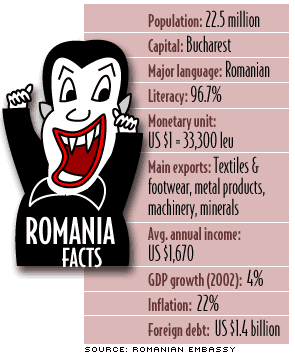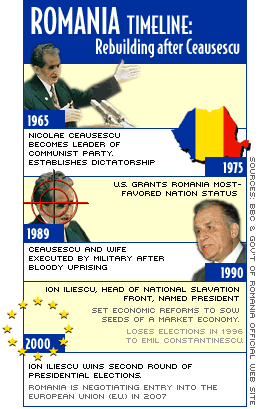NEW YORK (CNN/Money) -
If U.S. institutional investors go "Halloweening" in Dracula's Transylvanian neighborhood this year, a knock on Romania's door could get a tasty treat in the bag -- one without the sour center.
"Romania has studied its problems of the 1990s very well over the past two years. It has a small market, with very little foreign debt. It's also attracting foreign investment on a steady basis," said George Hardy, director at the Center for Strategic and International Studies in Washington, D.C.
It's been 13 years since Romania became one of the last Eastern European nations to overthrow Communist rule.
Since the military-style execution of its dictator Nicolae Ceausescu in 1989, political and economic change in the Balkan state hasn't stalled, although it has been choppy at best.
"With very little leverage, the country is doing well. The money coming in is meeting a very low base but delivering high returns. That's critical, especially when we're experiencing global credit contraction," Hardy added.
Fast expansion
So just how well is Romania doing as it pursues a course to a free market economy?
The economy has expanded solidly for two straight years, the reward of reforms first initiated by President Ion Iliescu in the early 1990s. Romania's gross domestic product this year is valued at $34 billion, with 4.5 percent growth forecast for 2002 after 5.3 percent growth in 2001. That runs contrary to the ongoing global economic downtrend.

Compare the growth to its Eastern European neighbors. Poland had 1 percent GDP growth in 2001, the Czech Republic had 3.3 percent growth, the Slovenian Republic registered 3.0 percent growth and there was 3.3 percent growth for the Slovak Republic.
Inflation is still high at 22 percent. But it's creeping down from 24 percent earlier in the year.
Analysts say Romania's foreign debt is extremely low at just over 30 percent of GDP, and this is because Romania did not borrow during the Soviet era. That fact alone is bringing in more money from the European Union.
Meanwhile, the modest Bucharest Stock Exchange has logged some impressive returns this year. The country's BET 10 index -- listing the 10 most liquid stocks on the exchange -- is up 115 percent year-to-date in local currency terms as of Oct. 23. It's up 105 percent in dollar terms.
By contrast, the Dow Jones industrial average is down 15.68 percent year-to-date, while the tech-heavy Nasdaq is down 33.72 percent. The Standard & Poor's 500 index, a gauge of the broader market, has slumped 22.47 percent.
With the still high level of inflation and consequently, a devalued national currency (the leu), one positive repercussion is that the situation is ripe for foreign capital inflows.

"Low debt, a depreciation trend for the leu, and relatively prudent macroeconomic policies are increasing the prospect for further investment from the EU," said Nima Tayebi, director of the Scudder emerging markets debt team with Deutsche Asset Management in London.
Some of those "prudent" policies included decentralizing Romania's economic institutions and banks and privatizing some of the more than 30 state-owned companies.
"Romania is also placing new bonds in a recent effort to attract capital inflows into the market for facilitating infrastructure improvement," said Jose Barrioneuvo, head of the Barclays Capital emerging market strategy group.
For example, Romania's national company for freight railway transport -- CFR Mafra -- on Tuesday hired Deutsche Bank and Salomon Smith Barney to sell $96 million in five-year bonds.
The International Monetary Fund (IMF) also gave a nod of approval to Romania's pace of reforms by releasing the second disbursement of $410 million in loans to support the ongoing monetary and economic reforms. This is significant especially after both the IMF and the World Bank postponed their decision in May to grant new loans until Romania pushes ahead with reforms.
Money from both institutions would also likely provide crucial seed money to develop Romania's industrial and agricultural sectors.
NATO, EU entry is the end game
Romania's entry into both the North Atlantic Treaty Organization and the European Union would likely signal that one of the poorest countries in Europe is now a worthy investment for the traditional powers of the West.
One could happen as early as next month, when NATO -- formed to defend against Romania and others of the Soviet bloc during the Cold War -- decides whether to admit new members.

"An invitation to join NATO during the Prague meeting in November would help bolster public support for Romania's reform process," said Tayebi.
But EU admission will have wait until 2007-2008. As a result of an Irish referendum Monday, the EU has agreed to admit 10 new members by 2004, mostly from the former Communist bloc. Even though Bulgaria and Romania didn't make the first cut, analysts say Romania's chances are pretty strong in the second round.
Should U.S. investors care?
Romania is a good diversity prospect for bigger investors who have a more padded risk cushion, experts say. Romania has struggled hard against the stereotype, but it still bears the stigma of rampant corruption that's typical of an economy in transition.
"The country has rich information technology capabilities, a vast pool of software engineers and a huge untapped agricultural potential in a very profitable niche area," Hardy said. "The country also boasts a large stock of a literate and skilled work force, where education is free until the age of 16."
"There's good opportunity for business partnerships in areas of software engineering, telecom, energy and water infrastructure development, especially in light of the fact that the government is on a mission to decentralize and reduce bureaucracy," he added.
For the individual investor eyeing an international market, Romania is probably not a top-of-the-line pick, and won't be for a while. In fact, only one U.S.-based mutual fund exists -- the Julius Bayer International Equity Fund (JIEIX: up $0.13 to $19.55, Research, Estimates) -- with minuscule exposure to Romania. With $833 million in assets, the fund's year-to-date returns are down 7.17 percent.
Mutual funds tracker Morningstar calls it an "unconventional fund" whose managers aren't afraid to make big changes in their sector or country stakes. The fund has about a 1.74 percent exposure of its net assets in Romania. Still, the bulk of the fund's asset allocation favors Western Europe.

|

